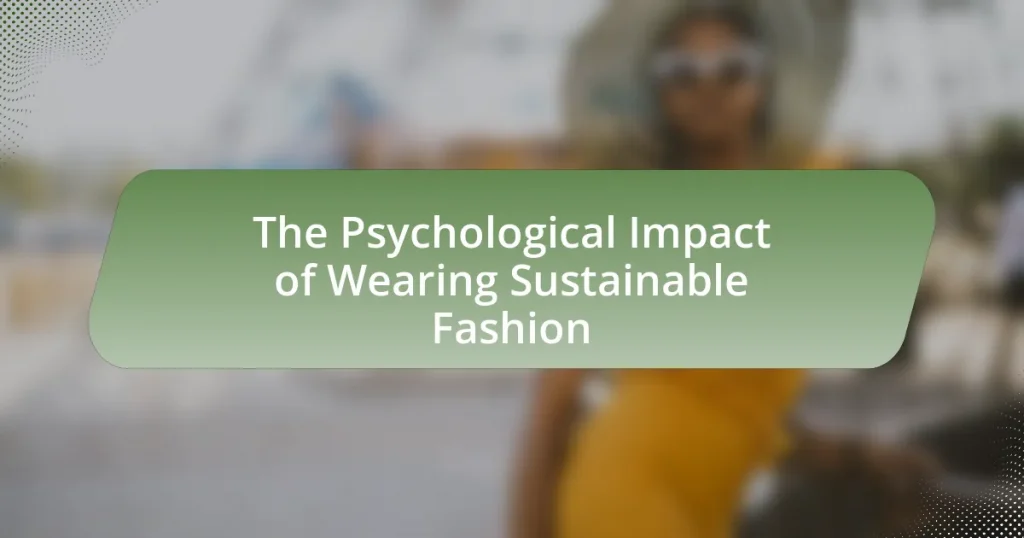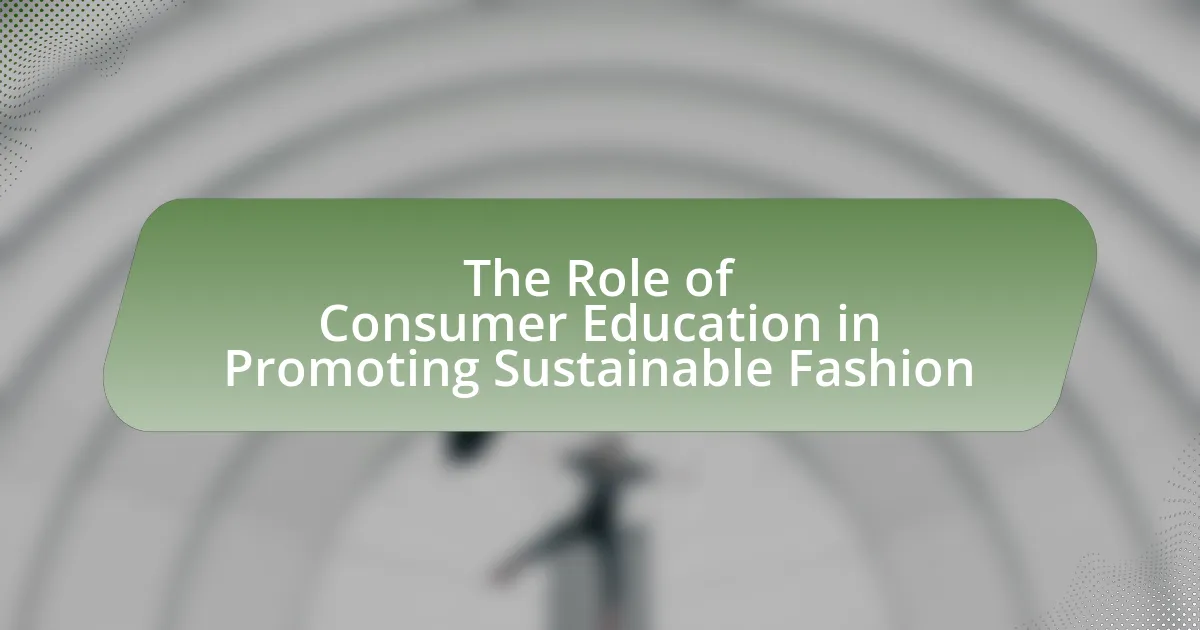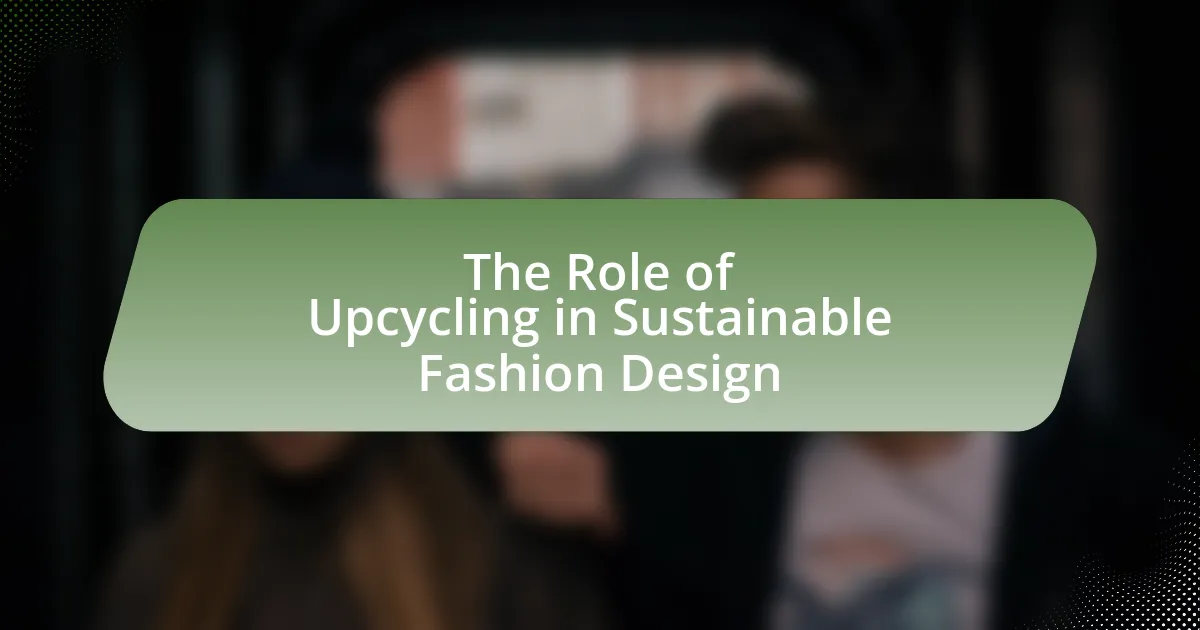The article examines the psychological impact of wearing sustainable fashion, highlighting its positive effects on self-esteem, life satisfaction, and overall mental well-being. It discusses how eco-conscious clothing choices foster a sense of identity, belonging, and empowerment, while also reducing anxiety and promoting social responsibility. The article further explores the motivations behind consumers’ shift towards sustainable fashion, the influence of social identity on these choices, and the long-term psychological benefits associated with embracing sustainable practices. Additionally, it provides practical tips for curating a sustainable wardrobe that aligns with personal values and enhances psychological well-being.
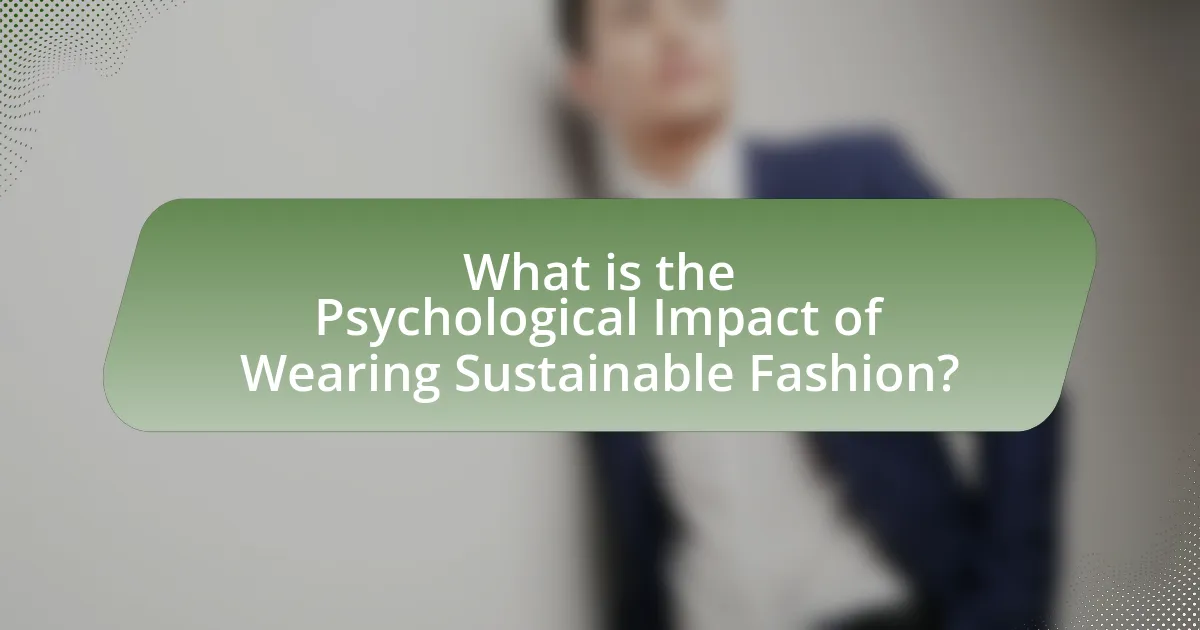
What is the Psychological Impact of Wearing Sustainable Fashion?
Wearing sustainable fashion positively impacts psychological well-being by enhancing self-esteem and promoting a sense of purpose. Individuals often feel empowered and socially responsible when they choose eco-friendly clothing, which can lead to increased happiness and satisfaction. Research indicates that consumers who engage in sustainable practices report higher levels of life satisfaction and lower levels of anxiety, as they align their purchasing decisions with their values. A study published in the Journal of Consumer Research found that ethical consumption fosters a sense of identity and belonging, further reinforcing the psychological benefits associated with sustainable fashion choices.
How does wearing sustainable fashion influence individual self-esteem?
Wearing sustainable fashion positively influences individual self-esteem by fostering a sense of identity and purpose. Individuals often feel empowered and confident when they align their clothing choices with their values, particularly regarding environmental and social responsibility. Research indicates that consumers who engage in ethical consumption, such as purchasing sustainable fashion, report higher levels of self-esteem and life satisfaction. A study published in the Journal of Consumer Research found that individuals who buy eco-friendly products experience a boost in self-worth due to the alignment of their purchases with their personal values and beliefs. This connection between sustainable fashion and self-esteem highlights the psychological benefits of making conscious consumer choices.
What psychological benefits are associated with eco-conscious clothing choices?
Eco-conscious clothing choices provide psychological benefits such as enhanced self-esteem, reduced anxiety, and a sense of belonging. Individuals who wear sustainable fashion often experience increased self-worth due to their alignment with ethical values and environmental responsibility. Research indicates that engaging in pro-environmental behaviors, like choosing eco-friendly clothing, can lead to lower levels of anxiety and stress, as individuals feel they are contributing positively to the planet. Additionally, wearing sustainable fashion can foster a sense of community and belonging among like-minded individuals, reinforcing social connections and support networks.
How does sustainable fashion affect body image perceptions?
Sustainable fashion positively affects body image perceptions by promoting inclusivity and self-acceptance. Brands that focus on sustainability often emphasize diverse body types and ethical production, which can lead to a more positive self-image among consumers. Research indicates that when individuals wear clothing that aligns with their values, such as sustainability, they report higher levels of self-esteem and body satisfaction. A study published in the Journal of Fashion Marketing and Management found that consumers who engage with sustainable fashion are more likely to feel empowered and confident in their appearance, as they associate their clothing choices with positive environmental and social impacts.
Why do consumers choose sustainable fashion over fast fashion?
Consumers choose sustainable fashion over fast fashion primarily due to a growing awareness of environmental and ethical issues associated with clothing production. This shift is driven by concerns about the negative impact of fast fashion on the planet, including pollution and waste, as well as labor practices that often exploit workers. Research indicates that 66% of global consumers are willing to pay more for sustainable brands, reflecting a strong preference for products that align with their values. Additionally, sustainable fashion often promotes a sense of individuality and authenticity, appealing to consumers who seek to express their identity through their clothing choices.
What motivations drive the shift towards sustainable fashion choices?
The motivations driving the shift towards sustainable fashion choices include environmental concerns, ethical considerations, and social responsibility. Consumers increasingly prioritize sustainability due to the negative impacts of fast fashion on the environment, such as pollution and resource depletion. A 2021 survey by McKinsey & Company found that 67% of consumers consider the use of sustainable materials important when making fashion purchases. Additionally, ethical concerns regarding labor practices in the fashion industry motivate consumers to seek brands that promote fair labor conditions. The growing awareness of climate change and its effects further reinforces the desire for sustainable options, as individuals recognize their purchasing power can contribute to positive change.
How does social identity play a role in sustainable fashion preferences?
Social identity significantly influences sustainable fashion preferences by shaping individuals’ values and behaviors related to clothing choices. People often align their fashion decisions with their social groups, which can include environmental activists, ethical consumers, or fashion-forward communities that prioritize sustainability. Research indicates that individuals are more likely to adopt sustainable fashion practices when they perceive these choices as reflective of their social identity, enhancing their belongingness and self-concept. For instance, a study published in the Journal of Consumer Research found that consumers who identify with eco-conscious groups are more inclined to purchase sustainable brands, as these choices reinforce their group identity and social status.
What are the emotional responses linked to sustainable fashion consumption?
Emotional responses linked to sustainable fashion consumption include feelings of pride, satisfaction, and empowerment. Consumers often experience pride in making environmentally conscious choices, which enhances their self-image and aligns with their values. Satisfaction arises from the knowledge that their purchases contribute to ethical practices and reduce environmental harm. Empowerment is felt as individuals recognize their role in promoting sustainability and influencing the fashion industry. Research indicates that consumers who engage in sustainable fashion report higher levels of positive emotions and a sense of community with like-minded individuals, reinforcing their commitment to sustainable practices.
How does wearing sustainable fashion contribute to feelings of empowerment?
Wearing sustainable fashion contributes to feelings of empowerment by fostering a sense of agency and responsibility in consumers. When individuals choose sustainable clothing, they actively participate in promoting ethical practices and environmental conservation, which enhances their self-esteem and personal values. Research indicates that consumers who engage in sustainable fashion report higher levels of satisfaction and pride in their choices, as they align their purchases with their beliefs about social and environmental justice. This alignment creates a psychological boost, reinforcing their identity as conscientious individuals who contribute positively to society.
What role does guilt play in the decision to wear sustainable clothing?
Guilt significantly influences the decision to wear sustainable clothing by prompting individuals to reconsider their consumption habits and environmental impact. This emotional response often arises from awareness of the negative consequences associated with fast fashion, such as pollution and exploitation of labor. Research indicates that feelings of guilt can lead consumers to seek out more ethical alternatives, as they aim to alleviate their conscience by making choices that align with their values. For instance, a study published in the Journal of Consumer Research found that consumers who experience guilt are more likely to engage in pro-environmental behaviors, including purchasing sustainable apparel.
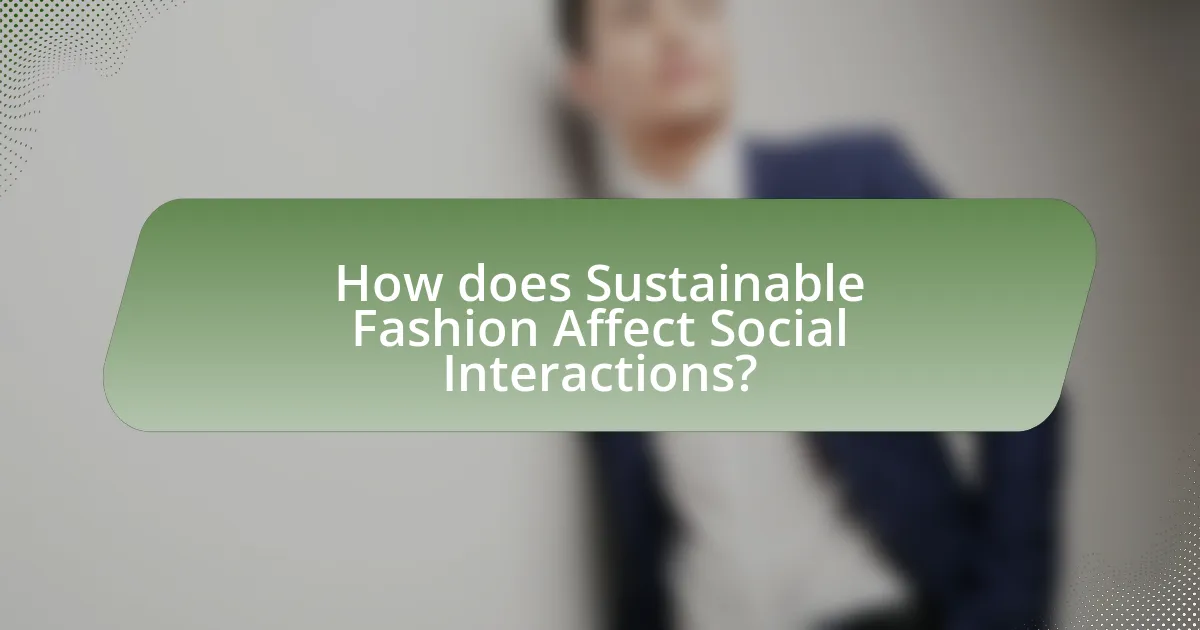
How does Sustainable Fashion Affect Social Interactions?
Sustainable fashion positively affects social interactions by fostering a sense of community and shared values among individuals who prioritize ethical consumption. When people wear sustainable clothing, they often engage in conversations about environmental issues and ethical practices, creating connections based on mutual interests. Research indicates that consumers who choose sustainable fashion are more likely to participate in social groups that advocate for sustainability, enhancing their social networks and support systems. For instance, a study published in the Journal of Consumer Research found that individuals who identify with sustainable brands report higher levels of social engagement and community involvement, demonstrating that sustainable fashion not only influences personal identity but also strengthens social bonds.
What impact does wearing sustainable fashion have on social perceptions?
Wearing sustainable fashion positively influences social perceptions by enhancing an individual’s image as environmentally conscious and socially responsible. Research indicates that consumers often associate sustainable fashion with higher ethical standards, leading to increased admiration and respect from peers. A study published in the Journal of Consumer Research found that individuals wearing eco-friendly clothing are perceived as more trustworthy and caring, which can enhance social interactions and relationships. This shift in perception can also encourage others to adopt sustainable practices, creating a ripple effect in social circles.
How do peers react to individuals who wear sustainable fashion?
Peers generally react positively to individuals who wear sustainable fashion, often viewing them as environmentally conscious and socially responsible. This positive perception is supported by studies indicating that sustainable fashion choices can enhance social status and foster a sense of community among like-minded individuals. For instance, research published in the Journal of Fashion Marketing and Management found that consumers who engage in sustainable fashion practices are often admired and respected by their peers, leading to increased social acceptance and validation.
What stereotypes are associated with sustainable fashion wearers?
Sustainable fashion wearers are often stereotyped as being environmentally conscious, socially responsible, and sometimes perceived as elitist or overly trendy. This stereotype arises from the association of sustainable fashion with eco-friendly practices and a commitment to ethical consumption, which can lead to the perception that these individuals prioritize sustainability over other factors like cost or convenience. Additionally, some view sustainable fashion wearers as part of a niche market that is more affluent, as sustainable clothing can be more expensive than fast fashion alternatives. This perception is supported by studies indicating that consumers who prioritize sustainability often have higher income levels and education, reinforcing the stereotype of elitism within this demographic.
How does sustainable fashion influence group dynamics?
Sustainable fashion influences group dynamics by fostering a sense of community and shared values among individuals who prioritize ethical consumption. When people wear sustainable clothing, they often feel a connection to others who share similar beliefs about environmental responsibility and social justice, which can enhance group cohesion. Research indicates that individuals who engage in sustainable practices are more likely to collaborate and support one another, creating a positive feedback loop that strengthens group identity. For example, a study published in the Journal of Consumer Research found that consumers who identify with sustainable brands report higher levels of social interaction and community engagement, demonstrating that sustainable fashion can effectively shape group dynamics.
What role does sustainable fashion play in community building?
Sustainable fashion plays a crucial role in community building by fostering connections among individuals who share values of environmental responsibility and ethical consumption. This shared commitment encourages collaboration and support within communities, as people engage in initiatives like clothing swaps, local sustainable markets, and workshops that promote eco-friendly practices. Research indicates that communities involved in sustainable fashion initiatives report increased social cohesion and a sense of belonging, as participants often form networks that extend beyond fashion to include broader environmental and social issues. For instance, a study by the University of Cambridge found that sustainable fashion initiatives can enhance community engagement and collective action, reinforcing the idea that fashion choices can significantly impact social dynamics and community identity.
How can sustainable fashion foster connections among like-minded individuals?
Sustainable fashion fosters connections among like-minded individuals by creating a shared commitment to ethical practices and environmental responsibility. This shared value system encourages collaboration and community-building through events, social media platforms, and local initiatives focused on sustainability. For instance, studies show that individuals who engage in sustainable fashion practices often participate in community events, such as clothing swaps or eco-friendly workshops, which facilitate networking and relationship-building. Additionally, brands that promote sustainable fashion frequently cultivate online communities where consumers can share experiences and support one another, reinforcing their collective identity and purpose.
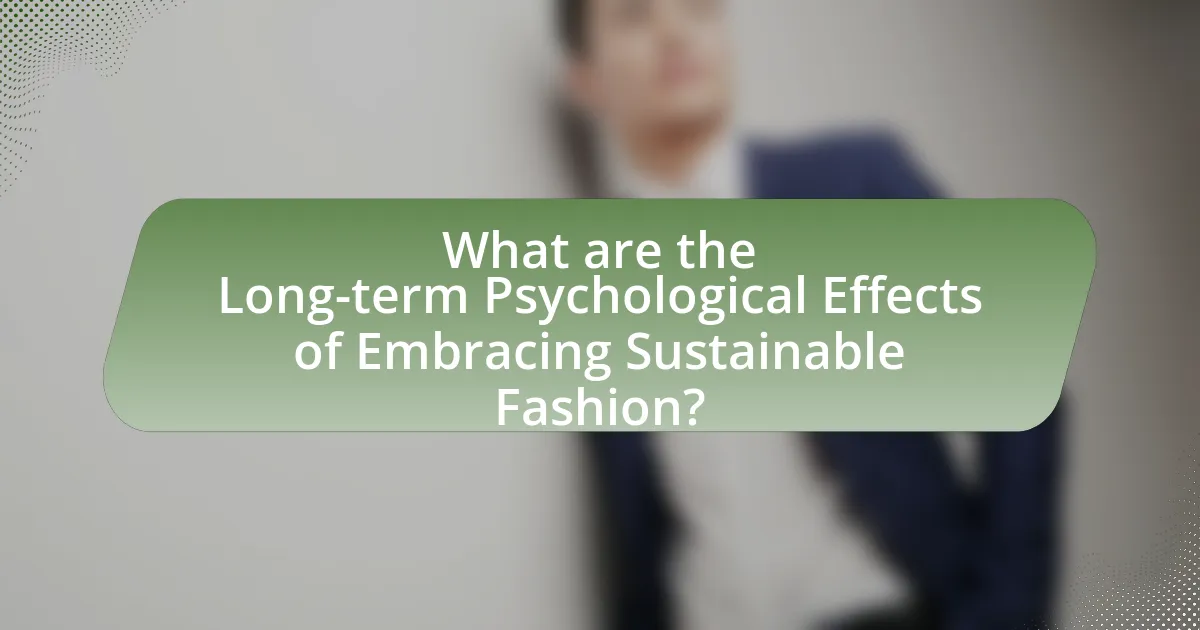
What are the Long-term Psychological Effects of Embracing Sustainable Fashion?
Embracing sustainable fashion leads to positive long-term psychological effects, including enhanced self-esteem, increased sense of community, and reduced anxiety related to environmental concerns. Individuals who adopt sustainable fashion practices often report feeling more aligned with their values, which boosts self-worth and personal identity. Research indicates that consumers engaged in ethical consumption experience greater life satisfaction and a sense of purpose, as they contribute to environmental sustainability and social justice. Additionally, participating in sustainable fashion communities fosters social connections, which can alleviate feelings of isolation and promote mental well-being.
How does a commitment to sustainable fashion shape personal values over time?
A commitment to sustainable fashion shapes personal values over time by fostering a deeper awareness of environmental and social issues. Individuals who prioritize sustainable fashion often develop a sense of responsibility towards ethical consumption, leading to values such as environmental stewardship and social justice. Research indicates that consumers who engage with sustainable brands are more likely to adopt pro-environmental behaviors in other areas of their lives, reinforcing their commitment to sustainability. For instance, a study published in the Journal of Consumer Research found that individuals who identify with sustainable fashion are more inclined to support eco-friendly practices and advocate for social change, demonstrating a significant shift in personal values aligned with sustainability over time.
What changes in mindset occur with long-term sustainable fashion wearers?
Long-term sustainable fashion wearers experience a significant shift towards valuing ethical consumption and environmental responsibility. This change in mindset often leads to increased awareness of the fashion industry’s impact on the planet, fostering a preference for quality over quantity in clothing choices. Research indicates that individuals who adopt sustainable fashion practices tend to develop a stronger sense of identity linked to sustainability, which can enhance their overall well-being and satisfaction. Furthermore, studies show that these wearers often become advocates for sustainable practices, influencing their social circles and contributing to a broader cultural shift towards sustainability in fashion.
How does sustainable fashion influence lifestyle choices beyond clothing?
Sustainable fashion influences lifestyle choices beyond clothing by promoting environmentally conscious behaviors and ethical consumption. Individuals who engage with sustainable fashion often adopt practices such as reducing waste, supporting local artisans, and prioritizing quality over quantity in various aspects of their lives. For instance, a study published in the Journal of Consumer Research found that consumers who prioritize sustainability in fashion are more likely to engage in eco-friendly practices, such as recycling and reducing plastic use. This shift in mindset extends to food choices, transportation methods, and overall consumption habits, leading to a more holistic approach to sustainability.
What are the potential mental health benefits of adopting sustainable fashion?
Adopting sustainable fashion can lead to several mental health benefits, including increased self-esteem and a sense of purpose. Individuals often experience enhanced self-worth when they make environmentally conscious choices, as these decisions align with their values and contribute positively to society. Research indicates that engaging in sustainable practices can reduce feelings of anxiety and depression, as individuals feel empowered by their contributions to environmental preservation. A study published in the Journal of Environmental Psychology found that individuals who engage in pro-environmental behaviors report higher levels of life satisfaction and well-being. This connection between sustainable fashion and mental health underscores the positive psychological impact of making mindful clothing choices.
How can sustainable fashion contribute to reduced anxiety and stress levels?
Sustainable fashion can contribute to reduced anxiety and stress levels by promoting a sense of purpose and connection to ethical practices. When individuals wear clothing made from sustainable materials, they often feel a greater alignment with their values, which can enhance their overall well-being. Research indicates that engaging in environmentally friendly practices can lead to increased feelings of happiness and reduced stress, as individuals perceive their choices as contributing positively to the world. For instance, a study published in the Journal of Environmental Psychology found that individuals who engage in sustainable behaviors report lower levels of anxiety and higher life satisfaction. This connection between sustainable fashion and mental health underscores the psychological benefits of making mindful clothing choices.
What role does sustainable fashion play in promoting overall well-being?
Sustainable fashion plays a significant role in promoting overall well-being by fostering a sense of purpose and connection to ethical practices. When individuals choose sustainable clothing, they often experience increased satisfaction and reduced anxiety, as they align their purchasing decisions with their values. Research indicates that consumers who engage in sustainable fashion report higher levels of happiness and fulfillment, as they contribute to environmental preservation and social responsibility. For instance, a study published in the Journal of Consumer Research found that individuals who prioritize sustainability in their fashion choices experience enhanced self-esteem and a stronger sense of community. This connection to positive environmental and social impacts reinforces their overall well-being.
What practical tips can enhance the psychological benefits of wearing sustainable fashion?
Wearing sustainable fashion can enhance psychological benefits by fostering a sense of purpose and identity. Engaging with brands that prioritize ethical practices can lead to increased self-esteem and satisfaction, as individuals feel aligned with their values. Research indicates that consumers who choose sustainable clothing report higher levels of happiness and fulfillment, as they contribute to environmental preservation and social responsibility. Additionally, curating a wardrobe with high-quality, timeless pieces can reduce decision fatigue and promote a positive self-image, further enhancing mental well-being.
How can individuals curate a sustainable wardrobe that reflects their values?
Individuals can curate a sustainable wardrobe that reflects their values by prioritizing ethical brands, selecting high-quality materials, and embracing second-hand shopping. Ethical brands often adhere to fair labor practices and environmentally friendly production methods, which align with values of social responsibility and sustainability. High-quality materials, such as organic cotton or recycled fabrics, not only reduce environmental impact but also ensure longevity, reducing the need for frequent replacements. Additionally, second-hand shopping promotes circular fashion, minimizing waste and extending the lifecycle of garments. According to a report by the Ellen MacArthur Foundation, extending the life of clothing by just nine months can reduce carbon, water, and waste footprints by 20-30%. This approach allows individuals to express their values through their clothing choices while contributing positively to the environment.
What strategies can help maintain a positive mindset while transitioning to sustainable fashion?
To maintain a positive mindset while transitioning to sustainable fashion, individuals can adopt strategies such as setting realistic goals, educating themselves about sustainable practices, and engaging with supportive communities. Setting realistic goals helps manage expectations and reduces feelings of overwhelm, making the transition feel achievable. Educating oneself about the environmental and social benefits of sustainable fashion fosters a sense of purpose and motivation, as studies show that informed consumers are more likely to feel empowered in their choices. Engaging with supportive communities, whether online or in-person, provides encouragement and shared experiences, reinforcing positive feelings and commitment to sustainable practices.
